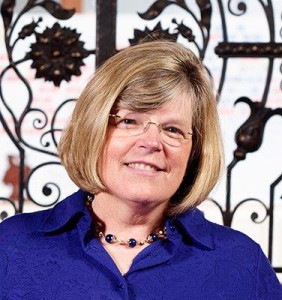 Last week, I was happily recalling my 2012 trip to Finland, specifically a visit to my ancestral village, Teuva. I had the great good luck to meet cousins there and see the land that my ancestors farmed – and even the foundation of the tiny house where my grandmother grew up. Continue reading Planning an ancestral trip
Last week, I was happily recalling my 2012 trip to Finland, specifically a visit to my ancestral village, Teuva. I had the great good luck to meet cousins there and see the land that my ancestors farmed – and even the foundation of the tiny house where my grandmother grew up. Continue reading Planning an ancestral trip
Category Archives: Research Methods
Middlesex County probate records now online
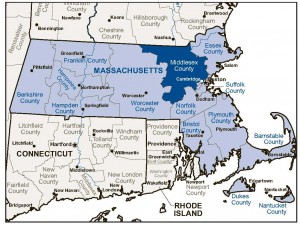
Middlesex County was created on 10 May 1643 as one of the original four counties of the Massachusetts Bay Colony. The other original counties were Essex, Suffolk, and a now extinct Norfolk – a name later reused for a different geographic region in the state.
At its founding, Middlesex County covered a broad swath of Massachusetts. The county was bordered to the north by New Hampshire, to the east by Essex County, to the south by Suffolk County, and to the west by New York – until Hampshire County was created in 1662. Continue reading Middlesex County probate records now online
“Very impertinent”: Elizabeth Chandler of Woodstock
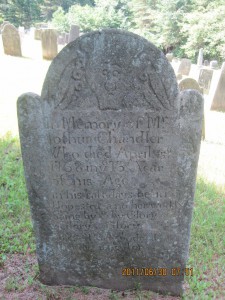
Sometimes, the most interesting stories are found when you weren’t looking for them, as in the following example. I was searching for a simple marriage record in the town of Woodstock, Connecticut. While I eventually found the record I was seeking, what I noticed immediately above that record was a series of intriguing entries. The records read as follows[1]:
1. “Chandler, Elizabeth, was requested Nov. 11, 1743 to make a public confession”
2. “Her letter of conf. was read at ch. meeting Nov. 25, 1743 and considered ‘very impertinent’” Continue reading “Very impertinent”: Elizabeth Chandler of Woodstock
Sprechen Sie Deutsch?
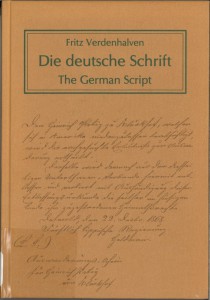
An article linked from The Weekly Genealogist had me thinking about how to conduct research in unfamiliar languages. I will soon receive eight microfilm reels containing German Catholic church records. The contents will be recorded in Latin, but key information could appear in German script. Sometimes it melds together to the point I’ve completely forgotten which language I am reading.
For the most part, church, and vital records adhere to a template, so even those of us who do not know the language can parse out facts pertinent to our ancestors. The key to accomplishing this feat lies in referring to guides to the language and/or records.
To help, Rhonda McClure has created a guide to German research for us. Some institutions post online translation tips and vocabulary lists. Brigham Young University offers some great script tutorials, and the FamilySearch wiki features a variety of language aids. Continue reading Sprechen Sie Deutsch?
A code of ethics
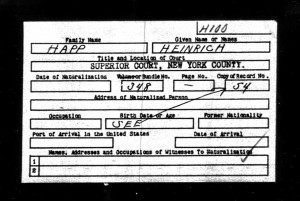 Disclaimer: If you are a member of the Happ family of Doylestown, Pennsylvania, please read no further.
Disclaimer: If you are a member of the Happ family of Doylestown, Pennsylvania, please read no further.
I think I’ve done something bad. I may never be invited to another Thanksgiving dinner. I’ll never be allowed to see my family again.
I think I just discovered that my family has ties to New York City. Continue reading A code of ethics
“My ancestor was born … where?!”
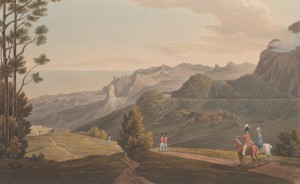
One must always expect surprises when researching family history, because you just never know what you might uncover.
When researching my paternal ancestors, I discovered that our family had ties to one of the most remote places on the planet: the island of Saint Helena. Made famous as the location of Napoleon Bonaparte’s second exile, Saint Helena is a rocky, volcanic island located in the South Atlantic Ocean between South America and Africa. Continue reading “My ancestor was born … where?!”
Mapping Vermont
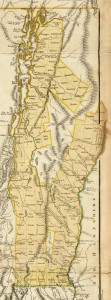 As part of the Society’s Ask a Genealogist service, I was recently asked about locating someone in post-Revolutionary War Strafford, Vermont. The time frame in which this person lived reminded me of the special considerations for this region, which was once hotly disputed by New Hampshire, New York, Vermont, and even Massachusetts.
As part of the Society’s Ask a Genealogist service, I was recently asked about locating someone in post-Revolutionary War Strafford, Vermont. The time frame in which this person lived reminded me of the special considerations for this region, which was once hotly disputed by New Hampshire, New York, Vermont, and even Massachusetts.
The territory that would become today’s Vermont was claimed by both New Hampshire and New York in the mid-eighteenth century, a squabble that took years to sort out. In general the land grants made by New Hampshire governor Benning Wentworth between 1749 and 1764 lay in territory already claimed by New York. A royal decree of 1764 awarded jurisdiction over the disputed territory to New York, which created four counties: Albany (established in 1764), and from Albany County Gloucester (1766) and Charlotte and Cumberland Counties (1772). Continue reading Mapping Vermont
Insights from my great-grandmother’s diary
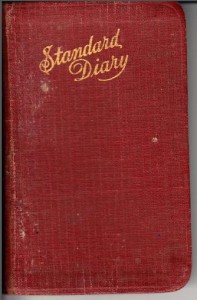 If your family is anything like mine, you heard plenty of stories about your great-grandparents from your parents. From those stories I have been able to get a sense of their personalities and how they lived, but it is a view limited to how my parents knew them as their grandparents. Learning who your ancestors were as young adults is difficult, since most standard documents do not reveal an individual’s personality. My mother has a genealogical file on each of my relatives, where she keeps news clippings or other documents pertaining to their lives, which I often refer to while I am researching my family. During my last visit home, while searching through her files, I discovered the diary of my great-grandmother, Gladys Tompkins, from the year 1924. Continue reading Insights from my great-grandmother’s diary
If your family is anything like mine, you heard plenty of stories about your great-grandparents from your parents. From those stories I have been able to get a sense of their personalities and how they lived, but it is a view limited to how my parents knew them as their grandparents. Learning who your ancestors were as young adults is difficult, since most standard documents do not reveal an individual’s personality. My mother has a genealogical file on each of my relatives, where she keeps news clippings or other documents pertaining to their lives, which I often refer to while I am researching my family. During my last visit home, while searching through her files, I discovered the diary of my great-grandmother, Gladys Tompkins, from the year 1924. Continue reading Insights from my great-grandmother’s diary
The Le Roy family register
 Here at NEHGS, we are always on the lookout for interesting genealogical books, pedigrees, or other formats for documenting family history. One of my first blog posts here covered the Society’s acquisition of a fascinating (and literal) family tree showing all of Queen Victoria’s descendants at the time of her Diamond Jubilee in 1897. Recently, I was directed to – and subsequently acquired – a Le Roy family register compiled by my cousin Edward Augustus Le Roy (1833–1913), one that showed all the descendants of the Le Roy immigrant down to about 1890. Continue reading The Le Roy family register
Here at NEHGS, we are always on the lookout for interesting genealogical books, pedigrees, or other formats for documenting family history. One of my first blog posts here covered the Society’s acquisition of a fascinating (and literal) family tree showing all of Queen Victoria’s descendants at the time of her Diamond Jubilee in 1897. Recently, I was directed to – and subsequently acquired – a Le Roy family register compiled by my cousin Edward Augustus Le Roy (1833–1913), one that showed all the descendants of the Le Roy immigrant down to about 1890. Continue reading The Le Roy family register
An unexpected helping hand

Tracing one’s family back to their country of origin can be daunting; often the birthplaces found on census records are just countries, with no indication given of province or county. Therefore, when I found my great-great-grandfather on the 1920 United States Federal Census, I groaned inwardly when I read the birthplaces of his parents: Scotland and Ireland.
William Muir’s parents were a Robert and Margaret Muir. As I noted yesterday, I found them in the 1860 United States Federal Census living in Charlestown, Massachusetts. Continue reading An unexpected helping hand